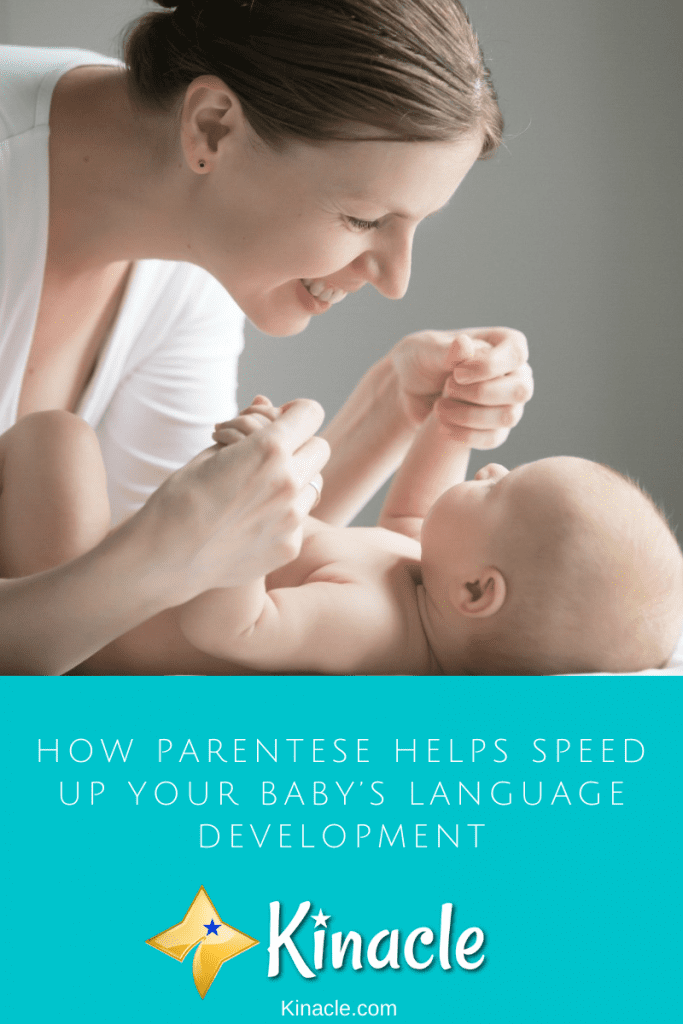
More than just baby talk, Parentese is a special kind of language used by moms, dads and loved ones to speak with their little ones! Read on and learn how it can boost both language and brain development.
Hello, everyone! We’d like to introduce you to someone very special.
This is baby Allen. Don’t be shy. Say “Hello!”. Allen is very sociable and loves nothing more than talking and interacting with all those around him:
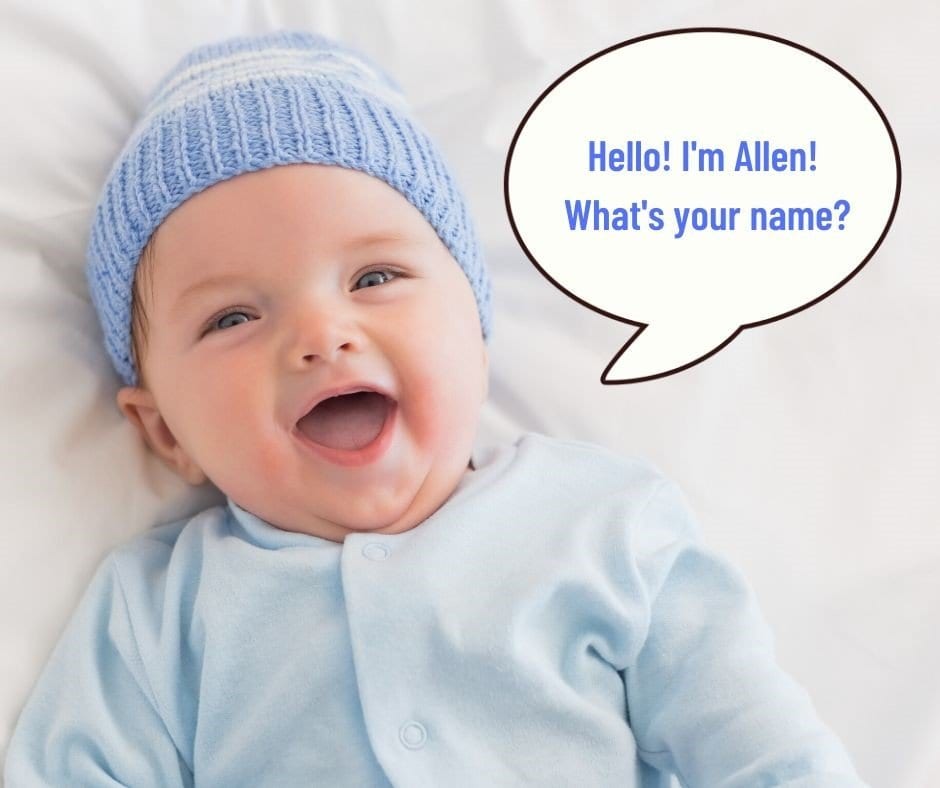
One of Allen’s most favorite thing to do is babble happily as he listens to his mom and dad talk to him in silly ways with funny expressions on their faces. Allen simply lights up with joy when his mom describes a toy to him in her high-pitched sing-song voice, “Looook at thiisss babyyy!! Iiiit’s aaaaa yeeelloww duucckyyy!”. Sometimes Grandma Gigi or his favorite Uncle Charlie comes over and they talk to him the same way too, “Hellloooooo liiiitttlle Alleeen! Whoooo’ss a cleeeverrr booooyy?” and Allen can’t help but giggle, laugh and babble back right at them.
But not everyone talks to him this way. One of Little Allen’s aunts, Gem, is a little quiet. She loves to play with him but Allen just gets a little restless around her. Aunt Gem just doesn’t talk the way Mom, Dad, Granny Gigi or Uncle Charlie talks to him. She doesn’t sound funny, she doesn’t make silly faces, she just talks, well, in normal way. No, no. Baby Allen prefers a singsong voice. That’s okay though, Aunt Gemmy, Allen seems to say as looks at her lovingly; we will be best buddies soon – just not today. Allen squirms from his Aunt Gemmy’s arms and reaches out for his Mom.
Why does Allen seem to specifically prefer one way of his family’s talking to him over another? Much like all other babies, Allen naturally responds and shows more active, alert interest to a parent-to-baby language called “Parentese”. Yes – that high-pitched voice you use when you’re interacting with your baby actually has a name and it’s been studied by experts for the past 30 years.
According to the Center for Early Literacy Learning:
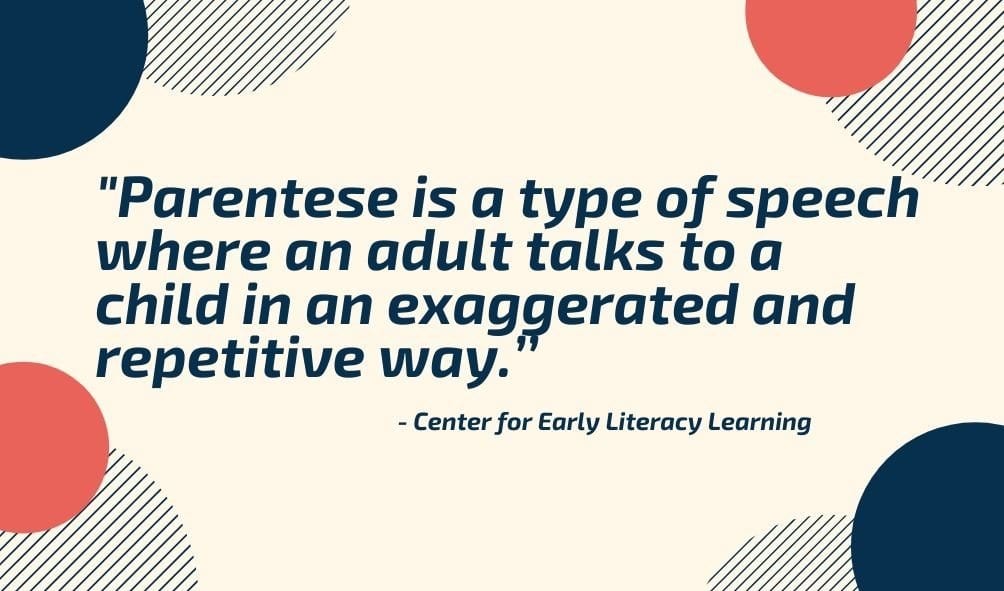
Parentese is also known as motherese, infant directed speech or IDS, child directed language or CDL and child directed speech or CDS.
While Parentese can still be classified as baby talk, it certainly isn’t the type of baby talk that doesn’t make any sense such as the ever-popular “Goo-goo, ga-ga”. Contrary to what anyone may think, language experts say that stringing senseless words or syllables together in a singsong voice while talking to your baby doesn’t help in their development in any way. In fact, so many myths abound when it comes to baby’s language development. Before we further talk about the benefits of Parentese, let’s have a look at the most common baby language myths:
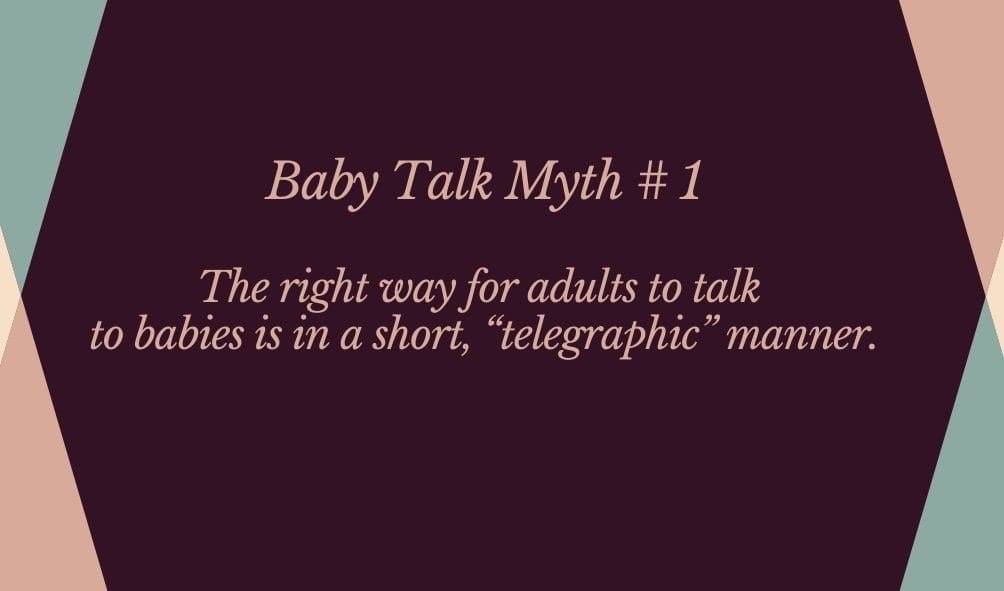
It’s a common myth that’s definitely what it is – just a myth.
Because babies are so tiny and cute, us grown-ups may instinctively feel that we need to use telegraphic speech when interacting with them. Characterized by short, simple and usually grammatically incorrect sentences, telegraphic speech is actually discouraged among speech experts. According to Marc Fey, a professor in the Department of Hearing and Speech at the University of Kansas Medical Center, “telegraphic speech makes it harder for children to learn grammar because it strips away the very markers from language models that children need to hear.”
An example of telegraphic speech might be “Look fishy small!” when trying to point out a fish while taking your baby to the city aquarium. This sentence is obviously grammatically incorrect and the right way to say it would be “Look at those fish! They’re so small, aren’t they?” but some people believe saying complete sentences may confuse babies. Nothing can be farther than the truth.
It is a common, yet very incorrect belief, that paring down a sentence into simpler terms helps put focus on what we are trying to say – which, based on our example – the focus words are “fish” and “small”. However, by over-simplifying sentences we take away what’s most important for a baby to learn – how our language actually works.
By using the right grammar, partnered with Parentese enunciations (high-pitched, with a focus on elongating vowels), we are actually building a baby’s early language foundations, paving the way for stronger and better vocabulary as they grow.
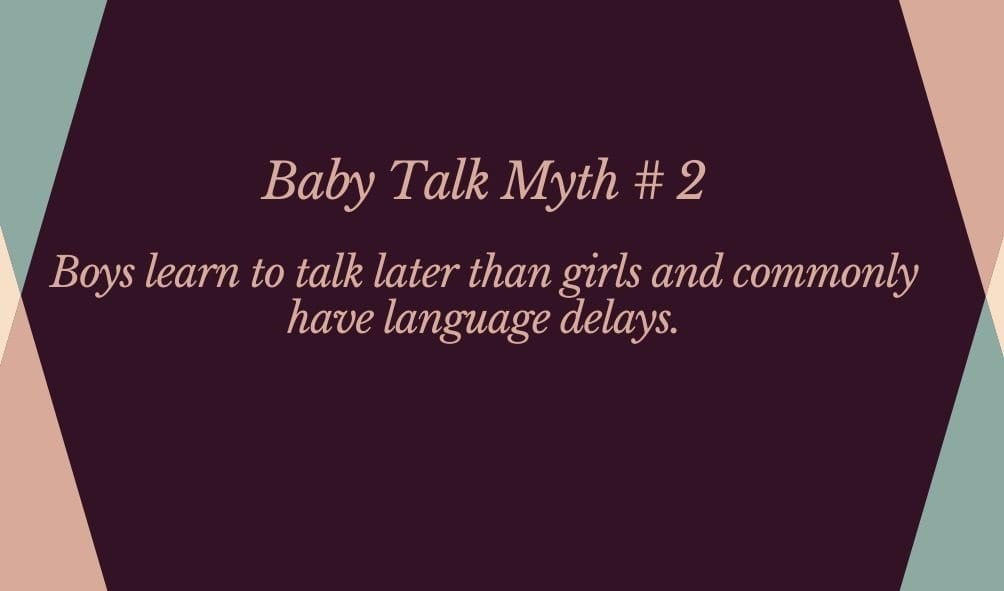
This myth is true but it shouldn’t be a cause for worry.
According to findings of a recent study published in the Journal of Child Psychology and Psychiatry (January 25, 2013), “exposure to high levels of testosterone before birth may increase the risk of delays in language development for boys”. Hence, boys’ language delays are most likely due to their naturally high testosterone levels. Girls then, since they do not have the same levels of testosterone as boys, develop speech earlier on.
However, linguistic experts say that baby boys should only be behind in the speech department around about 1 to 2 months from girls and from the time they turn 2 years old, most boys and girls should have about 50 words in their vocabulary and a keen sense for language.
If you have a son that you feel has speech delays for his age, it is best to consult with a speech-language pathologist.
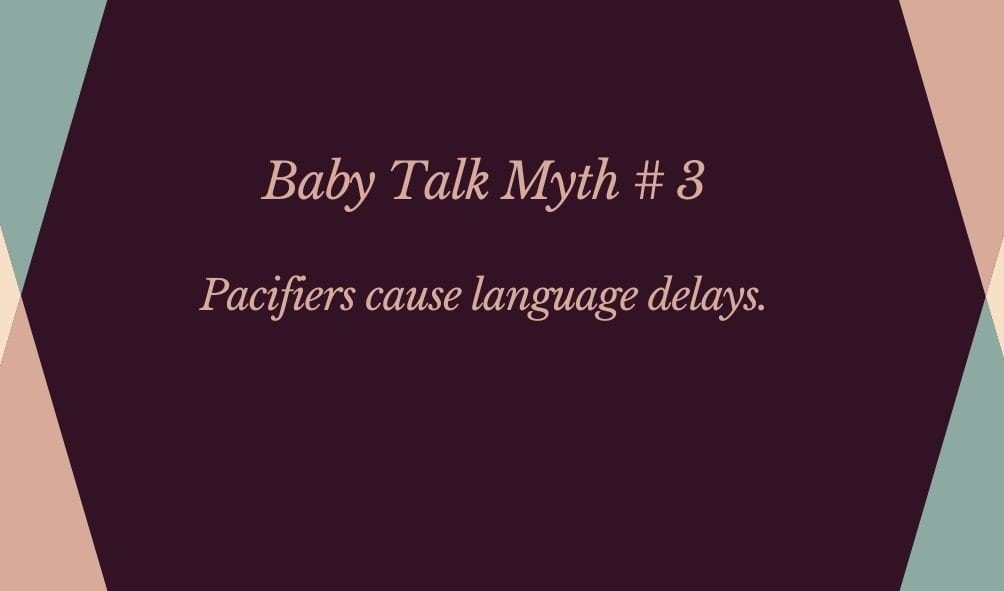
There is much debate around this myth but we feel that common sense prevails. While there is no direct, causal relationship between a pacifier and delayed speech, experts still agree that an overly-long usage of pacifiers may lead to speech difficulties. The reason behind this is because pacifiers promote an immature suck-and-swallow pattern, which may lead to underdeveloped movements of the tongue which will consequently lead to sound errors and delayed speech.
Our verdict? Pacifiers are definitely great for soothing and satisfying a fussy baby but its long-term use may impair a baby’s natural ability to form sounds and syllables correctly.
See: Pacifiers – Good Or Bad? 10 Interesting Facts About Pacifiers
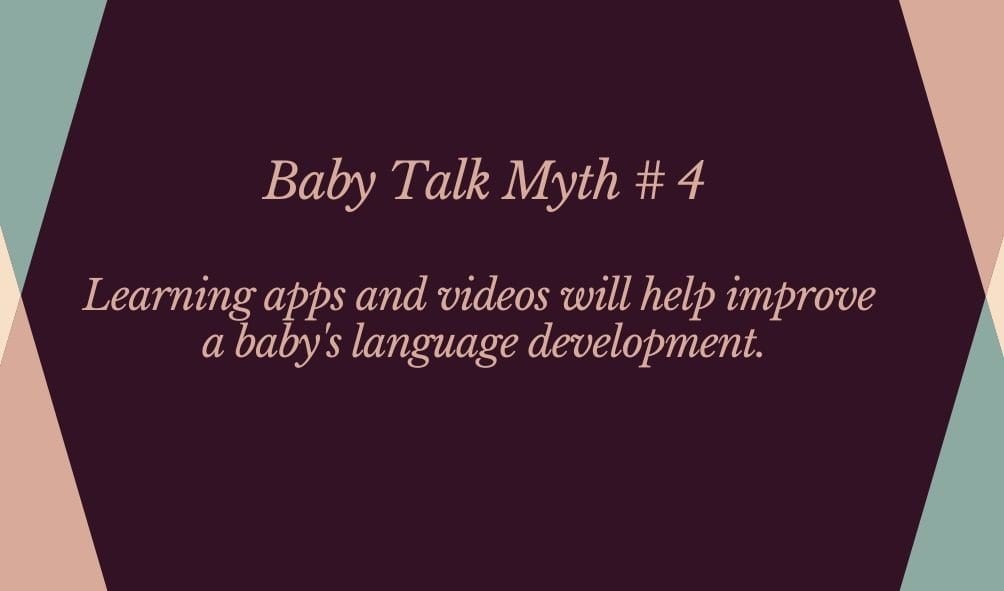
This is definitely a myth. Nothing can ever replace the importance of a parent’s presence and physical interaction with their baby. In fact, according to pediatrician Dr. David Hill, MD, FAAP, Vice President of Cape Fear Pediatrics in Wilmington, NC, and Adjunct Assistant Professor of Pediatrics at UNC Medical School, infants and toddlers should not be given any screen time before the age of 18 months because:
“It takes around 18 months for a baby’s brain to develop to the point where the symbols on a screen come to represent their equivalents in the real world. What infants and toddlers need most to learn is interaction with the people around them. That doesn’t mean that they shouldn’t video-chat with a distant grandparent or a deployed parent, but when it comes to day-to-day learning they need to touch things, shake them, throw them, and most of all to see the faces and hear the voices of those they love the most. Apps can teach toddlers to tap and swipe at a screen, but studies tell us that these skills don’t translate into real-world learning.”
Dr. Hill refers to screen time and educational videos as “mental junk food” for growing babies and that “good evidence suggests that screen viewing before age 18 months has lasting negative effects on children’s language development, reading skills, and short term memory. It also contributes to problems with sleep and attention.”
Based on the given information, it would be safe to conclude that apps and videos can be used to supplement learning and speech development but it’s certainly more beneficial to growing infants and toddlers to learn how to talk the through the most traditional sense – playing, interacting and talking with parents and loved ones, reading out loud, discovering and exploring.
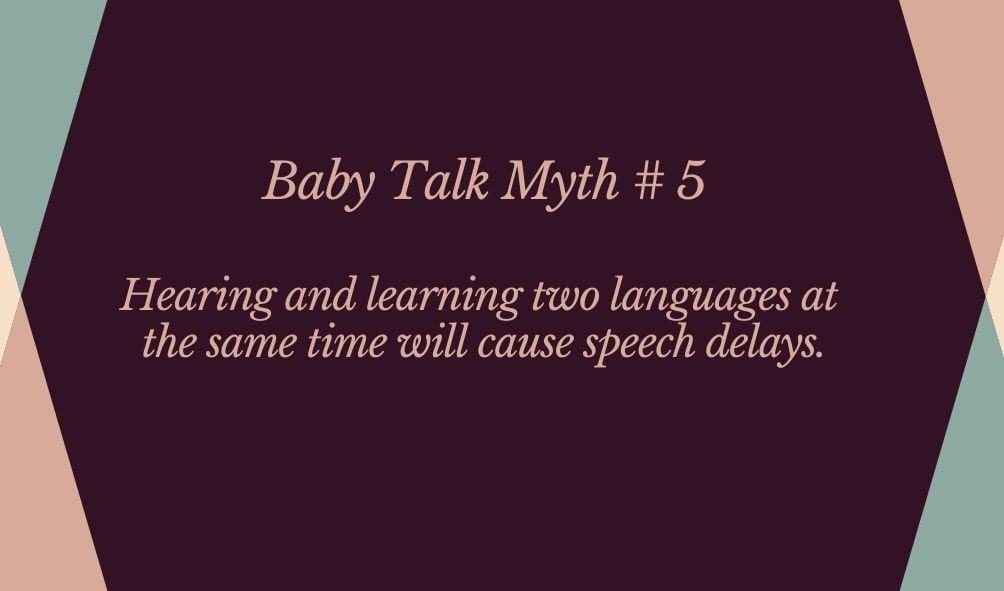
This one is a common worry among bilingual households. For example, let’s take baby Allen’s family:
Little Allen’s mom is Mexican and his dad is Australian but they are living in America. Allen simply loves it when his mom talks to him in a combination of Mexican and English and he squeals in delight when his dad exaggerates his Australian accent and sings Aussie nursery rhymes. However, since he is mostly surrounded by people who speak American English, it’s highly likely that Allen will grow up to speak perfectly good American English with maybe a slight hint of an Australian accent but will impress the ladies with his Spanish skills, as well.
Just like Allen, other babies growing up in the same bilingual or multi-lingual environment should find that learning two languages is never a hindrance to speech development. In fact, studies show that babies who grow up exposed to multiple languages have stronger cognitive skills and can talk much better, overall.
The only other consideration to think of, in terms of language delays, is that a bilingual child learning both Spanish and English may be slower to learn English-only words or Spanish-only words compared to a child exposed to single, English-only or Spanish-only environments. Still, it’s not a huge delay considering that the child is actually learning two languages at the same time and by the time the baby is 2 years old, parents won’t even notice a hint of a language delay.

So now that we’ve clarified some of the most common baby talk myths, we can finally see the importance of Parentese to a baby’s language and brain development.
The Benefits Of Parentese
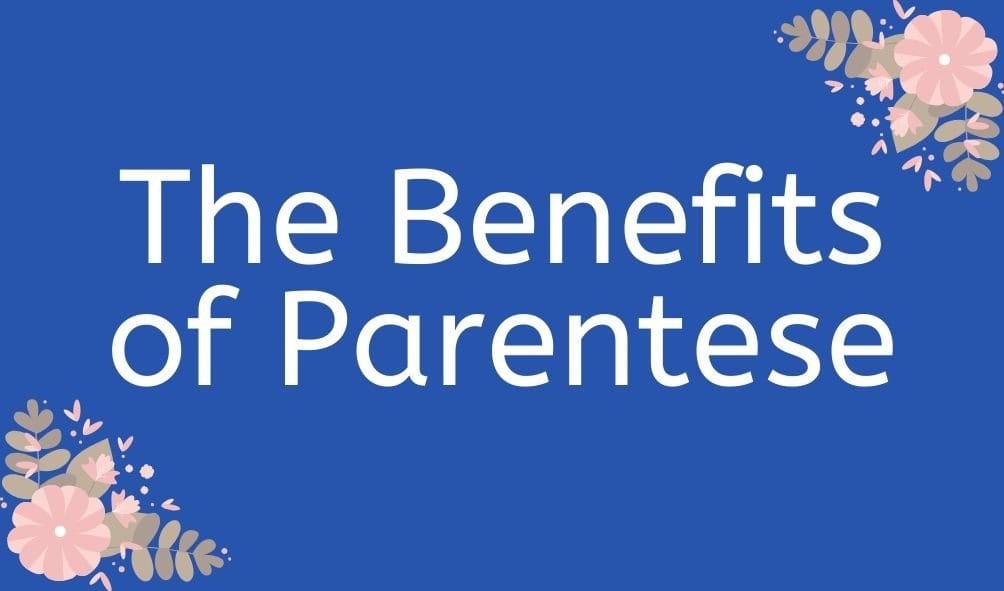
As mentioned in the earlier part of this article, Parentese is the special, instinctive singsong voice that parents use to communicate with their little ones. Sounding musical and exaggerated, Parentese is the opposite of nonsensical baby talk e.g. “Who’s widdle cutesie wootsiee?”. Rather, in Parentese, the sentence structure is grammatically correct. The focus is more on elongating vowels and varying pitch when saying the words e.g. “Whoooo’s my cuuuute little giiiirrrll? Don’t youuu looook speciaaal todayyy?”
According to Patricia Kuhl, professor of speech and hearing sciences and co-director of the Institute for Learning & Brain Sciences (I-LABS) at the University of Washington, “We know from over 30 years of research in the lab that infants prefer parentese over standard speech, and that infants who are exposed to more parentese at home have larger vocabularies as toddlers.”
Patricia Kuhl believes that the “simpler linguistic structure and exaggerated sounds” and “high pitch and slower tempo” makes Parentese so inviting and engaging to young babies. Through Kuhl’s important work at I-LABS, it is determined that Parentese not only attracts the ears and attention of babies, it also encourages them to respond, as well.
Here are some benefits of Parentese:
- Early language development. Because of the distinct drawing out of vowels and varying levels of pitch, babies actually learn the fundamentals of forming sounds together and learning to distinguish when one word ends and when another begins. We’re certainly not language experts but we like to compare it to teaching a 5-year old to read. Let’s say you’re teaching the word “plant” to Kindergartener. Wouldn’t you enunciate the “pl” sounds, elongate the “a” sound and end it with a high-pitched “nt”? In this manner, you’re carefully sounding out each letter of the word and combining them together. In the same way, a 5 or 6-month old who is exposed to consistent Parentese learns their first words by hearing parents and caregivers talk in a special, slower, more distinct way.
- Encourages interaction and social development. Babies LOVE Parentese so much, they actually prefer to listen to it over anything else. And Patricia Kuhl’s research proves it. See a video here of an adorable baby named Paul tested to see if he prefers normal adult speech or Parentese. In the video, you’ll see that Paul repeatedly turns to the recording of Parentese. You can see his obvious preference as Paul’s facial expressions are lively, responsive and just generally more comfortable with Parentese. In the same manner, if you take the time to interact with your baby in Parentese, you’ll see that it encourages them to engage and communicate back to you – even if it just sounds like meaningless babbles and gurgles.
- Lays the groundwork for a baby to learn and discover the world around him. Parentese often requires parents to talk about everything in general; from daily activities such as diaper changing to pointing out interesting things during walks in the park, Parentese actually helps young babies learn about their world in as early as their first few months. As you keep describing the world around your baby, you’ll one day be surprised that before your baby turns seven or eight months old, he’ll suddenly say out of the blue “cat!” as he sees the next-door neighbor’s cat sunning itself by the windowsill. You’re lucky if you got that on video! But if you didn’t, don’t worry. It’s just the beginning of more words added to your baby’s vocabulary.
How exactly does Parentese boost a baby’s brain development?
We’ll again look to the expertise of Patricia Kuhl to answer this question.
Due to advances in Neuroscience, it’s now possible for experts to study and view a baby’s brain activity when stimulated by communication and interaction. In the 36th Volume of the Zero to Three Journal published on January 2016, Andrew N. Metzhoff and Patricia Kuhl wrote:
“Seven- and 11- to 12-month-old infants listened to a series of native and foreign language syllables such as da and ta while in the MEG machine. The younger infants showed brain activity in several regions including an auditory area of the brain called the superior temporal gyrus, as expected—but also in Broca’s area and in the cerebellum, regions responsible for planning the motor movements required for speaking.”
Because Parentese stimulates important parts of the baby’s brain responsible for speech development, it’s safe to say that constant engagement and interaction with a baby in natural Parentese will certainly boost their overall language skills.
As natural as Parentese is to parents, though, I-LABS still found that coaching parents and giving parents guided Parentese sessions actually improved their baby’s language skills at an accelerated rate:
“In a previous study conducted in 2018, I-LABS researchers tracked use of parentese among adults and their 6-month-old infants, and found that babies whose parents participated in parentese coaching sessions babbled more and produced more words by age 14 months than infants whose parents were not directed in the technique.
The new study showed that children of coached parents produced real words such as “banana” or “milk” at almost twice the frequency of children whose parents were in the control group. Parent surveys estimated that the children’s 18-month vocabulary averaged around 100 words among children of coached families, compared to 60 words among children in the control group.”
That said, if you’d like to help your baby’s language development speed up even more, you can do a simple search online for Parentese tips or check out Parentese resources such as this Child-Directed Speech Dictionary from the Center for Early Literacy Learning.
In addition, here are some quick tips from Kinacle team for helping your child boost up language development:
- Play together. Describe toys as you’re playing (color, shape, texture) or think of imaginary characters using loud, exaggerated voices. Don’t be afraid to go all out.
- Talk a lot! During your baby’s most active hours, they love to hear you talk. Tell them about your day, describe to them what you’re doing and saying silly, funny things will make a huge difference. Be mindful of their moods, though. As small as they are, they get exhausted, too! When it’s naptime, it’s best to quiet down, dim the lights and settle in for their nap.
- Listen, too. For Parentese to work, you must also tune in and listen to your baby. When they something correctly (even incoherently), praise them, clap your hands and encourage them. This will signal to their actively developing brains that they did something good and they’ll be motivated to try and do it again.
- Read and read a lot. Try to incorporate reading out loud into your daily routine. Even if they can’t understand, they’ll love the sound of your voice. As you point out different interesting things in picture books, they’ll soon mimic and will be able to sound it out, as well. Shop for baby books on Amazon by clicking here!
- Play music often. From classic nursery rhymes to the Beatles, allow your baby to listen to music as often as possible. It’s a great way to learn how language works and it also helps boost brain development. If you know how to play a musical instrument, so much the better! They’ll love to hear you sing their favorite songs like The Wheels On The Bus or Twinkle Twinkle Little Star.
Conclusion:
A natural and singsong way to speak with babies, Parentese offers more than just cute ways to speak to our littlest ones. Parentese is a great way to help in your baby’s brain and language development.
Do you have any special stories about the way you speak with your babies? How do they respond? Let us know in the Comments section below. We’d love to hear from you!
Leave a Reply